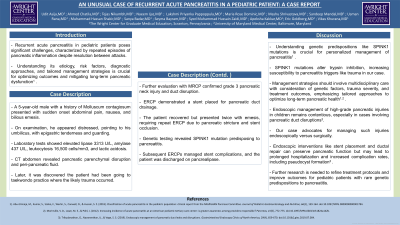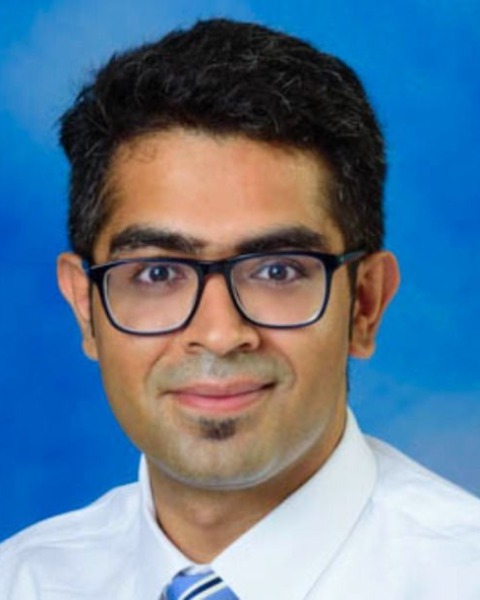Sunday Poster Session
Category: Biliary/Pancreas
P0156 - An Unusual Case of Recurrent Acute Pancreatitis in a Pediatric Patient: A Case Report
Sunday, October 27, 2024
3:30 PM - 7:00 PM ET
Location: Exhibit Hall E

Has Audio

Udit Asija, MD (he/him/his)
The Wright Center for Graduate Medical Education
throp, PA
Presenting Author(s)
Udit Asija, MD1, Ahmed Chatila, MD2, Tejas Nikumbh, MD1, Naeem Ijaz, MD1, Maria Rose Dominic, MD3, Lakshmi Priyanka Pappoppula, MD3, Mashu Shrivastava, MD3, Sandeep Mandal, MD3, Syed Muhammad Hussain Zaidi, MD3, Usman Rana, MD4, Sanya Badar, MD5, Seyma Bayram, MD1, Muhammad Hassan Shakir, MD3, Apeksha Kakkar, MD3, Eric Goldberg, MD6, Vikas Khurana, MD1
1The Wright Center for Graduate Medical Education, Scranton, PA; 2University of Pennsylvania Health System, Philadelphia, PA; 3The Wright Center for Community Health, Scranton, PA; 4The Wright Center for Graduate Medical Education, Scanton, PA; 5Wright Center for Graduate Medical Education, Scranton, PA; 6University of Maryland Medical Center, Baltimore, MD
Introduction: Recurrent acute pancreatitis in pediatric patients poses significant challenges, characterized by repeated episodes of pancreatic inflammation despite resolution between attacks. Understanding its etiology, risk factors, diagnostic approaches, and tailored management strategies is crucial for optimizing outcomes and mitigating long-term pancreatic dysfunction.
Case Description/Methods: A 5-year-old male with a history of Molluscum contagiosum presented with sudden onset abdominal pain, nausea, and bilious emesis following trauma during taekwondo practice. On examination, he appeared distressed, pointing to his umbilicus, with epigastric tenderness and guarding. Laboratory tests showed elevated lipase 3313 U/L, amylase 437 U/L, leukocytosis 16,500 cells/mm³, and lactic acidosis. CT abdomen revealed pancreatic parenchymal disruption and peri-pancreatic fluid. Later, it was discovered the patient had been going to taekwondo practice where the likely trauma occurred. Further evaluation with MRCP confirmed grade 3 pancreatic neck injury and duct disruption. ERCP demonstrated a stent placed for pancreatic duct drainage. The patient recovered but presented twice with emesis, requiring repeat ERCP due to pancreatic stricture and stent occlusion. Genetic testing revealed SPINK1 mutation predisposing to pancreatitis. Subsequent ERCPs managed stent complications, and the patient was discharged on pancrelipase.
Discussion: Understanding genetic predispositions like SPINK1 mutations is crucial for personalized management of pancreatitis. SPINK1 mutations alter trypsin inhibition, increasing susceptibility to pancreatitis triggers like trauma in our case. Management strategies should involve multidisciplinary care with consideration of genetic factors, trauma severity, and treatment outcomes, emphasizing tailored approaches to optimize long-term pancreatic health. Endoscopic management of high-grade pancreatic injuries in children remains contentious, especially in cases involving pancreatic duct disruptions. Our case advocates for managing such injuries endoscopically versus surgically. Endoscopic interventions like stent placement and ductal repair can preserve pancreatic function but may lead to prolonged hospitalization and increased complication rates, including pseudocyst formation. Further research is needed to refine treatment protocols and improve outcomes for pediatric patients with rare genetic predispositions to pancreatitis.
Disclosures:
Udit Asija, MD1, Ahmed Chatila, MD2, Tejas Nikumbh, MD1, Naeem Ijaz, MD1, Maria Rose Dominic, MD3, Lakshmi Priyanka Pappoppula, MD3, Mashu Shrivastava, MD3, Sandeep Mandal, MD3, Syed Muhammad Hussain Zaidi, MD3, Usman Rana, MD4, Sanya Badar, MD5, Seyma Bayram, MD1, Muhammad Hassan Shakir, MD3, Apeksha Kakkar, MD3, Eric Goldberg, MD6, Vikas Khurana, MD1. P0156 - An Unusual Case of Recurrent Acute Pancreatitis in a Pediatric Patient: A Case Report, ACG 2024 Annual Scientific Meeting Abstracts. Philadelphia, PA: American College of Gastroenterology.
1The Wright Center for Graduate Medical Education, Scranton, PA; 2University of Pennsylvania Health System, Philadelphia, PA; 3The Wright Center for Community Health, Scranton, PA; 4The Wright Center for Graduate Medical Education, Scanton, PA; 5Wright Center for Graduate Medical Education, Scranton, PA; 6University of Maryland Medical Center, Baltimore, MD
Introduction: Recurrent acute pancreatitis in pediatric patients poses significant challenges, characterized by repeated episodes of pancreatic inflammation despite resolution between attacks. Understanding its etiology, risk factors, diagnostic approaches, and tailored management strategies is crucial for optimizing outcomes and mitigating long-term pancreatic dysfunction.
Case Description/Methods: A 5-year-old male with a history of Molluscum contagiosum presented with sudden onset abdominal pain, nausea, and bilious emesis following trauma during taekwondo practice. On examination, he appeared distressed, pointing to his umbilicus, with epigastric tenderness and guarding. Laboratory tests showed elevated lipase 3313 U/L, amylase 437 U/L, leukocytosis 16,500 cells/mm³, and lactic acidosis. CT abdomen revealed pancreatic parenchymal disruption and peri-pancreatic fluid. Later, it was discovered the patient had been going to taekwondo practice where the likely trauma occurred. Further evaluation with MRCP confirmed grade 3 pancreatic neck injury and duct disruption. ERCP demonstrated a stent placed for pancreatic duct drainage. The patient recovered but presented twice with emesis, requiring repeat ERCP due to pancreatic stricture and stent occlusion. Genetic testing revealed SPINK1 mutation predisposing to pancreatitis. Subsequent ERCPs managed stent complications, and the patient was discharged on pancrelipase.
Discussion: Understanding genetic predispositions like SPINK1 mutations is crucial for personalized management of pancreatitis. SPINK1 mutations alter trypsin inhibition, increasing susceptibility to pancreatitis triggers like trauma in our case. Management strategies should involve multidisciplinary care with consideration of genetic factors, trauma severity, and treatment outcomes, emphasizing tailored approaches to optimize long-term pancreatic health. Endoscopic management of high-grade pancreatic injuries in children remains contentious, especially in cases involving pancreatic duct disruptions. Our case advocates for managing such injuries endoscopically versus surgically. Endoscopic interventions like stent placement and ductal repair can preserve pancreatic function but may lead to prolonged hospitalization and increased complication rates, including pseudocyst formation. Further research is needed to refine treatment protocols and improve outcomes for pediatric patients with rare genetic predispositions to pancreatitis.
Disclosures:
Udit Asija indicated no relevant financial relationships.
Ahmed Chatila indicated no relevant financial relationships.
Tejas Nikumbh indicated no relevant financial relationships.
Naeem Ijaz indicated no relevant financial relationships.
Maria Rose Dominic indicated no relevant financial relationships.
Lakshmi Priyanka Pappoppula indicated no relevant financial relationships.
Mashu Shrivastava indicated no relevant financial relationships.
Sandeep Mandal indicated no relevant financial relationships.
Syed Muhammad Hussain Zaidi indicated no relevant financial relationships.
Usman Rana indicated no relevant financial relationships.
Sanya Badar indicated no relevant financial relationships.
Seyma Bayram indicated no relevant financial relationships.
Muhammad Hassan Shakir indicated no relevant financial relationships.
Apeksha Kakkar indicated no relevant financial relationships.
Eric Goldberg indicated no relevant financial relationships.
Vikas Khurana indicated no relevant financial relationships.
Udit Asija, MD1, Ahmed Chatila, MD2, Tejas Nikumbh, MD1, Naeem Ijaz, MD1, Maria Rose Dominic, MD3, Lakshmi Priyanka Pappoppula, MD3, Mashu Shrivastava, MD3, Sandeep Mandal, MD3, Syed Muhammad Hussain Zaidi, MD3, Usman Rana, MD4, Sanya Badar, MD5, Seyma Bayram, MD1, Muhammad Hassan Shakir, MD3, Apeksha Kakkar, MD3, Eric Goldberg, MD6, Vikas Khurana, MD1. P0156 - An Unusual Case of Recurrent Acute Pancreatitis in a Pediatric Patient: A Case Report, ACG 2024 Annual Scientific Meeting Abstracts. Philadelphia, PA: American College of Gastroenterology.
